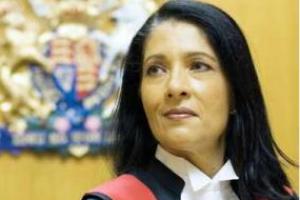
Every individual is equal before and under the law and has the right to the equal protection and equal benefit of the law without discrimination and, in particular, without discrimination based on race, national or ethnic origin, colour, religion, sex, age or mental or physical disability. Canadian Charter of Rights and Freedoms, Subsection 15(1)
“I’m a member of a visible minority. I’m a woman. I’m the child of immigrants, and an immigrant myself. I came to this country in 1961. English is my second language (although I was lucky enough that I took to it). In April 1985, the equality provisions of the Charter came into effect. And I remember celebrating that with all of the other students in law school in April of 1985.” Harbans Dhillon was born in Hong Kong and spent her early years in southeast Asia, but was raised and educated in Vancouver. After earning her BA, and then pursuing graduate studies in anthropology and sociology both at UBC, she decided those fields of study didn’t engage her sufficiently to pursue any further. Dhillon found work as a lay counselor with the Matsqui Abbotsford Legal Services Society and discovered that “law was really terrifically interesting.” She wrote the LSAT but, still not convinced of law as a career, applied only to UBC Law. The school said yes, and in the end, so did she.
Entering law school was Dhillon’s second immigration. “Law school itself is like a village,” she says. “It has its own culture, its own vocabulary. And it had its own sense of community and belonging. We learned to rely on each other, to shepherd each of us through the complete change in studying and viewing the world.” Just as she had once taken so readily to English, Dhillon found herself becoming fluent in the language of the law. Reading the daily papers, she realized one day, “I was reading those reports [of criminal matters or civil disputes] not just as any ordinary person from the public, but from the perspective of my legal training—looking to see what the issues were, what rules might apply. I realized there had been this subtle but discernible shift in my worldview.”
Motivated by her experiences as a woman and a member of a visible minority, and powerfully influenced by her advocacy work in the Fraser Valley, Dhillon became a champion of human rights. “Throughout law school, I was aware of the importance of law in making a change in the lives of people—women, immigrants, minorities.”
Dhillon articled with Bull Housser and Tupper in 1987, and practised with the firm from the time of her call in 1988 through 1999. During the same period, she served on the board of the BC Civil Liberties Association, helping to launch their pro bono program, was an active member of the West Coast LEAF (Women’s Legal Education and Action Fund) Association and taught civil litigation at UBC. Then she immigrated again.
In 1999, Harbans Dhillon became the first Indo-Canadian woman ever appointed to the Provincial Court of BC. “In a sense, judges are considered a bit of a world apart,” she says of the transition. “I don’t think I really thought seriously about it until I was about nine years or so into practice. I don’t believe anyone ever talks to law students about becoming a judge. Law students have real, immediate goals: to survive, to prosper as they learn the ropes, to get articles, to be kept on and then to find a place in the legal community. [The idea of judging] certainly wasn’t anywhere in my contemplation when I was going through law school.”
Dhillon’s ability to find herself at home in new territory may have much to do with her sense of gratitude, and the strength of her connection to her origins. She uses the words “community” and “family” frequently as she speaks, and it is fitting that the court on which she serves is responsible for youth criminal justice, work she describes as both heartbreaking and rewarding. “It’s been absolutely a profound sense of privilege for me to be given an opportunity to hold this office,” she says. “To be able to represent the Indo-Canadian community, and to indicate to the women of that community that they have a place in the majority culture is [an] achievement for me.” Dhillon names the Honourable Wally Oppal as a mentor and role model, someone who “has his roots in his community of origin but has managed to transcend that and become a very respected figure in the community at large. I hope that I can follow his lead.”
Dhillon hopes, too, that UBC Law will continue to provide a place of welcome for people who may enter with fears or doubts, as she did, and who may find themselves at first strangers in a strange land. “The law school … started certainly in the ’80s to represent the larger community. It does require hard work, skill and ability. But then you find a home there.”
Written by Diane Haynes and originally published in the UBC Law Alumni Magazine, Fall 2005. A PDF of the full issue can be found here.